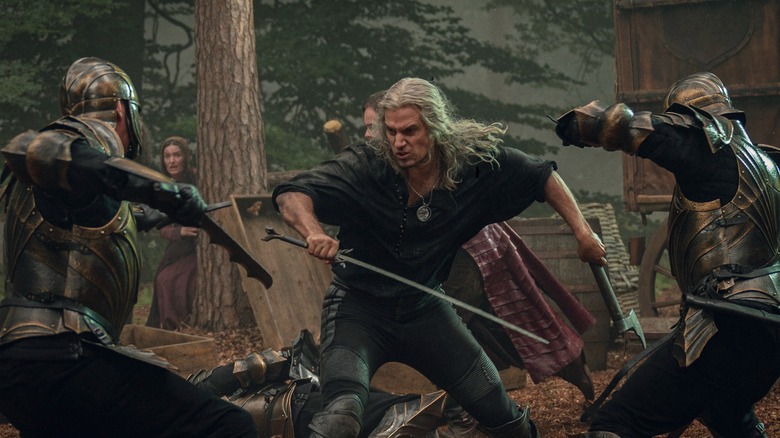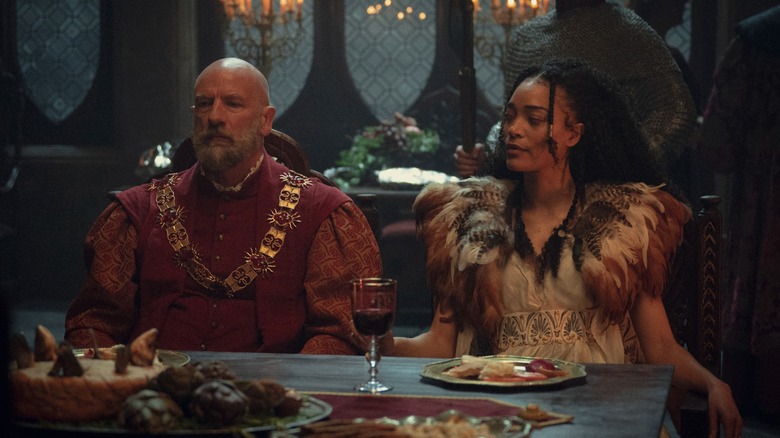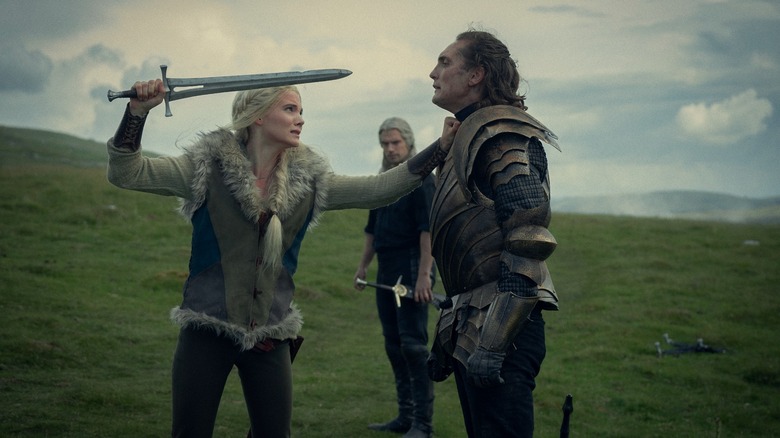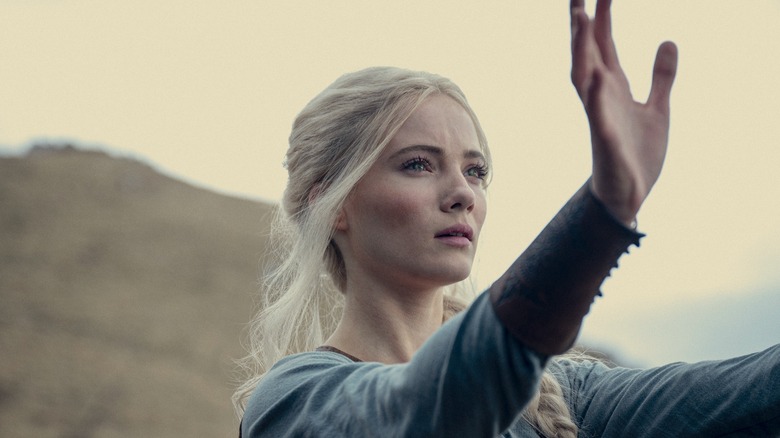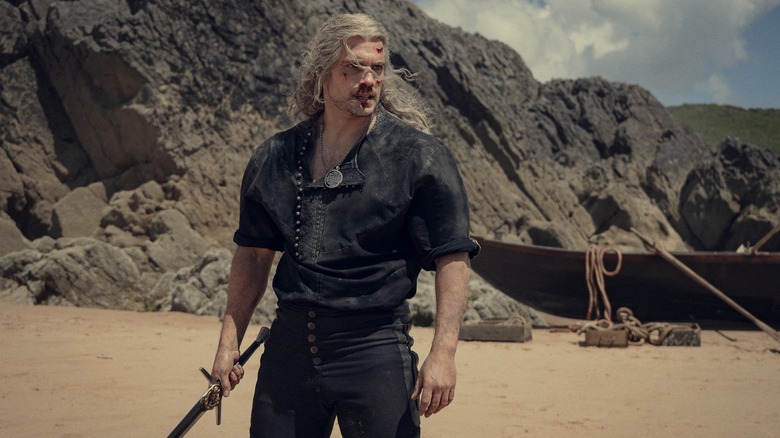The Witcher Season 3 Ending Explained: These Violent Delights Have Violent Ends
This post contains spoilers for Netflix's "The Witcher."
Andrzej Sapkowski's "Time of Contempt" — the second installment in his popular "The Witcher" novel series — throws the Continent into chaos from the get-go. With Nilfgaard trying to take over the rest of the Continent, Redania hatches their own plans to get the upper hand. However, unbeknownst to them, Nilfgaard is already one step ahead. These machinations culminate in the Conclave of the Mages right after the Thanedd Ball in Aretuza — a violent event in the history of the Continent that demolished the Brotherhood from within, which directly destabilized the power structures required to keep usurpers like Emperor Emhyr in check. Season 3 of "The Witcher" focuses exclusively on the Thanedd event and its disastrous aftermath, which tears Geralt (Henry Cavill), Yeneffer (Anya Chalotra), and Ciri (Freya Allan) apart once again.
With Cavill's departure at the end of this season, this particular installment of the Netflix series truly feels like the end of an era, as this version of Geralt has reached the end of his journey. Several arguments can be made about whether the show does justice to Geralt and Cavill with the season 3 storyline, but it is clear that "The Witcher" has now firmly shifted its attention to Ciri, who undergoes a critical transformation by the end of the season. While Volume I of the latest installment was able to balance contrarian aspects of a tale that brims with complicated lore, Volume II tries to rush through crucial events and arrive at an underwhelming climax a little too early, sacrificing emotional impact in the process.
While season 3 wraps up several stray threads and allows certain characters to evolve and mature, there is still much left to do, and many errant questions are left unanswered.
Blinded by power
Volume I's Thanedd Ball cliffhanger sets up the stage for startling revelations: a coup at Aretuza is currently underway and the true mastermind behind the disappearances is none other than Vilgefortz (Mahesh Jadu). This is already a lot to process, and episode 6 dives straight into the action without delving too much into the hows and whys of the events that occur. We know Vilgefortz is secretly in cahoots with Emperor Emhyr (Bart Edwards) and is responsible for the Scoia'tael ambush moments later, but why would a mage of his stature turn on his own people?
"Time of Contempt" reveals that after becoming aware of Ithelinne's prophecy, Vilgefortz approached Emhyr under the guise of being an emissary, and offered to help bring her back to Nilfgaard. Being the duplicitous manipulator he is, Vilgefortz intended to use the real Ciri for her Elder Blood while offering Imposter Ciri as a prize to Emhyr to appease him. While none of this is crystal clear in the series, Vilgefortz's impetus behind his actions is a need to covet more power, and he's willing to lie, conspire against, and kill his own people to get what he wants. This grants more context to his sudden romantic advances towards Tissaia (MyAnna Buring) — Vilgefortz simply wants to keep the sorceress in the dark until things are too late to salvage.
What complicates matters is Dijkstra's (Graham McTavish) and Philippa's (Cassie Clare) involvement in the coup before the ambush. While they orchestrate the coup with the intent of punishing Nilgaardian spies, the show doesn't provide evidence that back up their suspicions, making their actions look petty and unprovoked. In the books, the real spies were taken to Garstang, providing the coup with a practical reason to occur in the first place.
Difficult choices
After learning about Vilgefortz's betrayal, in an act of uncharacteristic cruelty, Tissaia brutally kills Francesca's (Mecia Simson) partner, intensifying an already-heated battle between the two groups. Crucial context is, once again, sacrificed here, as the sections where Ciri and Yen are brought in to discern the truth behind the attack in Dol Angra are completely omitted from the events. Moreover, Vizimir II's assassination occurs before the coup, painting Philippa's actions in a more unsavory tint — here, Vizimir is killed after the coup, with Philippa forcibly crowning a traumatized Radovid (Hugh Skinner), unwittingly birthing the reign of a mad tyrant.
Several difficult choices are made in these episodes: Yen chooses to help her people and leave Ciri with Geralt, Ciri decides to spare Cahir (Eamon Farren) after he expresses guilt and remorse, and Francesca holds her grief aside and fights. Tissaia, in her grief-stricken stupor, accidentally strikes her own mages with the thunder she summons, while Geralt has to abandon Ciri once again to defeat Vilgefortz for good. In the final showdown, however, Vilgefortz proves to be too powerful for the witcher, who is severely wounded to the point that he might die due to his injuries. This effectively puts Geralt on the sidelines, a decision that severely impedes the anticipation of watching Cavill end the show on a high note before his imminent exit.
The most difficult choice, however, is made by Ciri, who ends up in Korath after teleporting from Tor Lara. The unstable nature of the portal zaps her into this uninhabitable desert, and she undergoes a texting trial that allows her to embrace her true potential. We're introduced to her unicorn friend Little Horse, which begins her longstanding friendship with these creatures who will play a seminal role in aiding her down the line.
Child of the Elder Blood
While season 3 grants mixed results when it comes to tackling most book-specific plotlines, it makes leaps and bounds when it comes to Ciri, who is allowed to relish in the nuance of moral dilemmas. While Ciri has always been a victim of her circumstances, her run-in with Geralt and Yen made her more resilient over the years, to the point that she can slay Aeschnas and Wyverns on her own. However, what makes Ciri special is her ability to hold onto her sanity during extreme situations, a case in point being the Korath incident. Korath is unforgiving towards even the most powerful beings, and Ciri soon finds herself crumbling under the weight of thirst and painful hallucinations.
The arrival of Falka (Scarlett Maltman) further intensifies Ciri's spiral, as the Princess fuels her need to avenge her loved ones by reminding her that her true powers still remain untapped. With these repeated encounters with Falka comes the fear of abandonment. As Ciri is terrified of being left behind or forgotten by Geralt or Yen, she comes to the realization that the path ahead is lonely. Torn between keeping her loved ones safe and exploring her own abilities, Ciri ends up tapping into forbidden fire magic (which takes a toll on the psyche), but soon relinquishes all her abilities when she realizes that her enhanced status makes her more of a pawn for everyone hounding her.
After her Korath excursion, Ciri joins the Rats, who are a rag-tag group of mercenaries that kill for loot. Ciri's Rats arc will most likely be explored in the next season — it is the most morally dubious Ciri has ever been, as she starts associating the thrill of taking a life with personal satisfaction and purpose.
A new Geralt of Rivia
Geralt's arc in the season finale ends with a foregone conclusion: the man has given up his neutrality and has decided to take matters into his own hands. While this shift is meant to evoke some sort of great personal transformation, the show fails to understand that this shift has been in motion ever since Geralt met Ciri and that he has already chosen sides and made difficult choices.
Being a witcher means choosing a path of violence that is as balanced as possible (witchers slay monsters, not people, after all), but the socio-political environment in the Continent makes it nigh impossible for someone like him to stay neutral. Geralt never lacked compassion and is known to be pretty selfless when it comes to stepping in to enact justice when he wants to, which makes the big final farewell feel extremely underwhelming.
With Cavill exiting the show, we will have a new version of Geralt when Liam Hemsworth assumes the role in the next season. This shift can be jarring, but as long as the show is faithful to who Geralt is, this transition might propel us toward fresh directions. Moreover, Ciri will assume center-stage from now on, as she is the beating heart of this universe in many ways, and the story is expected to delve more into the horrors to come: The advent of The Wild Hunt and The White Frost that is set to destroy the world with its icy grasp. Resultantly, Geralt will now assume a supportive father-figure role — don't worry, he will still slash through monster guts and hopefully quip "Wind's howlin'", but the core axis and narrative emphasis of "The Witcher" are about to metamorphize soon.
Volume II of "The Witcher" season 3 is currently streaming on Netflix.
